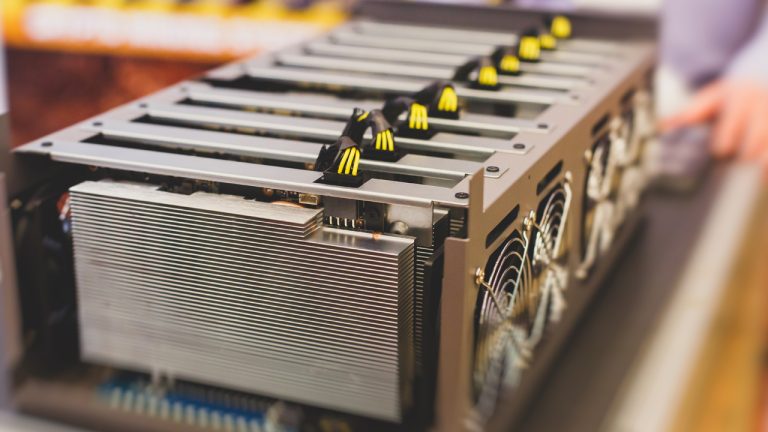 According to Lynette Zang, chief market analyst at ITM Trading, U.S. banks have the legal authority to confiscate people’s funds due to legislation passed by Congress. In a recent interview, Zang discussed how the purchasing power of the U.S. dollar has dwindled to “roughly three cents,” her belief that central bank digital currencies (CBDCs) will […]
According to Lynette Zang, chief market analyst at ITM Trading, U.S. banks have the legal authority to confiscate people’s funds due to legislation passed by Congress. In a recent interview, Zang discussed how the purchasing power of the U.S. dollar has dwindled to “roughly three cents,” her belief that central bank digital currencies (CBDCs) will […]
The Toronto-based Bitcoin mining company has reduced its debt by nearly 85% since June 2022.
Bitcoin (BTC) miner Bitfarms has settled its debt obligations with BlockFi, closing the chapter on its short relationship with the bankrupt cryptocurrency lender.
On Feb. 9, Bitfarms disclosed that it had settled its $21 million debt obligations with BlockFi for a single $7.75 million cash payment. The settlement was reached weeks after Bitfarms warned that it might default on its BlockFi loan.
“Combined with the earlier restructuring and elimination of our capital expenditure obligations in December, this successful negotiation and settlement furthers our initiatives to reduce indebtedness,” said Jeff Lucas, Bitfarms’ chief financial officer.
Bitfarms’ relationship with BlockFi centers around Backbone Mining Company, its wholly owned subsidiary in Washington state. Backbone Mining received a $32 million equipment financing loan from BlockFi in February 2022. By Jan. 31, 2023, the outstanding principal and interest on the loan totaled $21 million.
#Bitfarms has modified its loan agreement with BlockFi Lending LLC (Blockfi), to settle all outstanding principal and interest due totaling $21 million for a single cash payment of $7.75 million.
— Bitfarms (@Bitfarms_io) February 9, 2023
Press Release: https://t.co/QBD84U5NwA pic.twitter.com/x9Ahug7Nkp
Following the settlement, all of Backbone’s assets, including 6,100 miners, are unencumbered.
Cointelegraph reported on Jan. 13 that Bitfarms was seeking to modify its loan agreement with BlockFi to obtain “more favorable terms” and reduce Backbone Mining’s obligations. The original loan facility was secured against Backbone Mining’s assets, including its mining equipment and a percentage of the Bitcoin its rigs produced. The assets securing Backbone Mining’s loan dropped significantly during the bear market.
Related: Blockstream raises $125M to finance expanded Bitcoin mining operations
BlockFi filed for Chapter 11 bankruptcy on Nov. 28, mere weeks after the collapse of crypto exchange FTX. The lender received a $240 million rescue package from FTX US in July 2022, so its fate was seemingly tied to the health of Sam Bankman-Fried’s crypto empire.
 The Amesbury, Massachusetts-based Bankprov, a subsidiary of Provident Bancorp, has announced that it will no longer provide loans secured by cryptocurrency mining rigs. In a filing with the U.S. Securities and Exchange Commission (EX-99.1), Bankprov stated that revenue from its digital asset loan portfolio will continue to decrease as the company has discontinued new loan […]
The Amesbury, Massachusetts-based Bankprov, a subsidiary of Provident Bancorp, has announced that it will no longer provide loans secured by cryptocurrency mining rigs. In a filing with the U.S. Securities and Exchange Commission (EX-99.1), Bankprov stated that revenue from its digital asset loan portfolio will continue to decrease as the company has discontinued new loan […] Unredacted documents mistakenly sent to the bankruptcy court indicate that the now-defunct crypto lender Blockfi had more than $1.2 billion tied up with FTX and Alameda Research. The accidentally revealed documentation shows that Blockfi’s exposure to the bankrupt crypto firm FTX was more than what the company had previously disclosed. Unredacted Documents Reveal Blockfi’s $1.2 […]
Unredacted documents mistakenly sent to the bankruptcy court indicate that the now-defunct crypto lender Blockfi had more than $1.2 billion tied up with FTX and Alameda Research. The accidentally revealed documentation shows that Blockfi’s exposure to the bankrupt crypto firm FTX was more than what the company had previously disclosed. Unredacted Documents Reveal Blockfi’s $1.2 […] There is a reason centralized exchanges have dominated despite being antithetical to crypto’s core tenets. The following opinion editorial was written by Bitcoin.com CEO Dennis Jarvis. The gross mismanagement and outright fraud in 2022 by many opaque centralized exchanges are driving people back to the core tenets of crypto, such as decentralization, self-custody, transparency, and […]
There is a reason centralized exchanges have dominated despite being antithetical to crypto’s core tenets. The following opinion editorial was written by Bitcoin.com CEO Dennis Jarvis. The gross mismanagement and outright fraud in 2022 by many opaque centralized exchanges are driving people back to the core tenets of crypto, such as decentralization, self-custody, transparency, and […]
“During 2022, Bitfarms began taking proactive actions to increase financial flexibility and to reduce indebtedness and capital expenditure obligations,” according to CFO Jeff Lucas.
Bitcoin (BTC) mining company Bitfarms has unveiled plans to modify an existing loan agreement with BlockFi — a move the company said would reduce its indebtedness amid the bear market.
On Jan. 13, Bitfarm disclosed that it is working with creditors to modify a loan agreement for Backbone Mining Solutions, or BMS, which owns and operates Bitfarms’ 20-megawatt mining facility in Washington state. BMS received a $32 million equipment financing loan from Bitcoin lender BlockFi in February 2022. The loan was secured against existing BMS assets, including its miners and a certain percentage of BTC produced by its mining rigs.
When BMS received the loan facility, Bitcoin was trading north of $40,000. The value of the flagship digital asset has since plunged below $20,000, reaching a low of around $15,600 in November, according to data from Cointelegraph Markets Pro and TradingView.
As a result of the bear market, the assets securing BMS’ loan have fallen to around $5 million, while the outstanding principal and interest are roughly $20 million.
Bitfarms “determined that it would be advisable to seek more favorable terms from BlockFi and potentially take other steps to reduce the BMS obligations,” the company said.
Jeff Lucas, Bitfarms’ chief financial officer, further explained:
“Considering today’s challenging market conditions, we are seeking to modify our Washington state debt facility to achieve terms that are better aligned with the market outlook and our business strategy.”
Related: BTC price 3-week highs greet US CPI — 5 things to know in Bitcoin this week
Bitfarms and its subsidiaries hold roughly $36 million worth of unencumbered crypto assets against approximately $47 million worth of debt, which includes the $20 million BlockFi loan. In an effort to cut costs, the company has increased operational efficiency by deploying new miners.
️ Ben Gagnon, Chief Mining Officer: "In December, we deployed new miners and underclocked our least cost-efficient miners. This improved their efficiency by 15%, resulting in a reduction of nearly 4 MW of power consumption and representing substantial cost savings."#BITF #BTC pic.twitter.com/YR5dUtBa54
— Bitfarms (@Bitfarms_io) January 10, 2023
BlockFi is having difficulties of its own after filing for Chapter 11 bankruptcy in November. The Bitcoin lender shuttered its doors after crypto exchange FTX — its savior during the Terra ecosystem collapse — imploded with little warning.
The fallout of the FTX collapse continues to reverberate across the market. The exchange’s former CEO, Sam Bankman-Fried, faces eight criminal charges and up to 115 years in prison for his alleged role in defrauding investors.
 Gemini CEO Cameron Winklevoss has published another open letter on Twitter, addressed to the board members of Digital Currency Group (DCG). In the letter, Winklevoss accuses DCG and CEO Barry Silbert of making poor decisions with the now-defunct crypto hedge fund Three Arrows Capital (3AC), and claims that DCG orchestrated a “campaign of lies” in […]
Gemini CEO Cameron Winklevoss has published another open letter on Twitter, addressed to the board members of Digital Currency Group (DCG). In the letter, Winklevoss accuses DCG and CEO Barry Silbert of making poor decisions with the now-defunct crypto hedge fund Three Arrows Capital (3AC), and claims that DCG orchestrated a “campaign of lies” in […] Before FTX collapsed it was assumed that Alameda Research was one of the top quantitative trading firms and market makers within the industry. However, much of that perception may have been a facade as a recent report details that Alameda suffered from financial troubles as early as 2018. People familiar with the matter said Alameda […]
Before FTX collapsed it was assumed that Alameda Research was one of the top quantitative trading firms and market makers within the industry. However, much of that perception may have been a facade as a recent report details that Alameda suffered from financial troubles as early as 2018. People familiar with the matter said Alameda […] After the publicly-listed bitcoin mining firm Argo Blockchain suspended trading on Nasdaq and the London Stock Exchange, the company said it would follow up the next day with an announcement. The following day, on Dec. 28, 2022, Argo detailed it is selling its Helios facility to Galaxy Digital for $65 million, and the financially troubled […]
After the publicly-listed bitcoin mining firm Argo Blockchain suspended trading on Nasdaq and the London Stock Exchange, the company said it would follow up the next day with an announcement. The following day, on Dec. 28, 2022, Argo detailed it is selling its Helios facility to Galaxy Digital for $65 million, and the financially troubled […]
An affidavit by the FTX founder revealed Alameda funded the purchase of Robinhood shares which were later used as collateral for Alameda to secure a loan from BlockFi.
Sam Bankman-Fried, the disgraced founder of cryptocurrency exchange FTX, borrowed over $546 million from the exchange’s sister firm Alameda Research to fund his purchase of Robinhood shares.
Those same shares were later used by Bankman-Fried as collateral for a loan taken by Alameda from BlockFi, one of the entities that are laying claim to the shares.
An affidavit by Bankman-Fried filed in the Antigua and Barbuda High Court on Dec. 12 — the day of his arrest — and made public on Dec. 27, revealed he and FTX co-founder Zixiao “Gary” Wang took out the loans from Alameda through four promissory notes between April and May 2022.
On Apr. 30 loans of around $316.6 million and $35.1 million were given to Bankman-Fried and Wang respectively. Later, two loans of around $175 million and $19.4 million were given to Bankman-Fried on May. 15.
The loans were used to fund Bankman-Fried’s Antiguan-based shell company Emergent Fidelity Technologies Ltd. which acquired a 7.6% stake in brokerage firm Robinhood in May at a price of $648 million at the time.
He added that if the sum paid by Emergent for the shares was more than the stated $546 million he has “not [sic] doubt that such additional sum was borrowed by Gary and I” to fund the acquisition of the Robinhood shares.
The revelation of the loans could complicate the ongoing legal tug of war for the over 56 million shares in Robinhood that are now worth around $430 million.
Embattled crypto lender BlockFi is suing Bankman-Fried’s Emergent for the Robinhood shares that were allegedly pledged as collateral for BlockFi’s loans to Alameda on Nov. 9.
Related: Crypto OTC trading to get traction due to FTX fiasco, exec says
FTX stepped in on Dec. 23, asking for assistance from a U.S. bankruptcy judge to prevent BlockFi from claiming the shares. It said the shares are owned by Alameda and insisted FTX companies should keep the Robinhood stake while investigations continue into other claims of their ownership.
Additionally, Bankman-Fried and FTX creditor Yonathan Ben Shimon are laying claim to the shares.
Previously, FTX’s Chapter 11 bankruptcy filings in the United States revealed Bankman-Fried was on the receiving end of a $1 billion personal loan from Alameda.
Former Alameda CEO Caroline Ellison said on Dec. 23 as part of her plea deal that “Alameda was borrowing funds that FTX’s customers had deposited onto the exchange.”